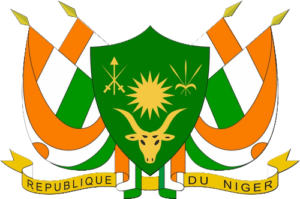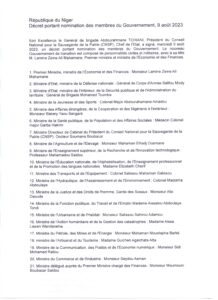Niger is located at the crossroads of North Africa and Sub-Saharan Africa. It is the largest country in West Africa and the 6th largest country in Africa (after Sudan, Algeria, Congo, Libya, and Chad). Neighbouring countries are Algeria and Libya in the North, Chad in the East, Nigeria and Benin in the South, Burkina Faso, and Mali in the West.
Geographic location:
Area:
Niger covers an area of 1.267.000 sq. km
Climate:
Niger has a Sahelian Continental climate, with four well-defined seasons:
- From June to September: rainy season characterized by stormy rains and relatively high humidity, with an average temperature of 33 ° C;
- From October to mid-November: a hot season without rain but relatively humid, with a temperature of 35 ° C;
- From the end of November to the end of February: a relatively cold season, with very cool nights during which the temperature sometimes falls below 10 ° C;
- From March to the end of May: a very hot season characterized by hot winds, during which the thermometer can reach 45 ° C in the shade and does not go down below 25 ° C at night.
Population:
Based on the 2012 General Population Census, the population of Niger was then 17.138.707 inhabitants. More recent estimates indicate that Niger’s population now exceeds 25.000.000 inhabitants. The population is predominantly young, with almost 50% under the age of 15 years. The population density is about 20 inhabitants per sq. km.
Capital city:
Niamey is the capital of Niger with a population of about 1.4 million inhabitants. Located in the western part of the country on the Niger River, Niamey is the seat of the Government, the Parliament, and the Central Administration of Niger. It is also an important economic centre at the crossroads of Burkina Faso, Benin, and Nigeria.
Administrative division:
Niger is divided into 8 regions: Agadez, Dosso, Maradi, Tahoua, Tillabery, Zinder, Diffa and Niamey (municipality with special status).
Niger is further divided into 63 departments and 266 municipalities.
Languages:
The official language is French, and the main national languages are Arabic, Boudouma, Djerma-Sonhraï, Gourmantchéma, Hausa, Kanouri, Fulfuldé, Tamacheq, Tassawaq and Toubou.
Religion :
Niger is a secular Republic respecting and protecting all beliefs. Outside of Islam representing over 95% of the population, Christianity and Animism are represented.
Currency:
CFA Franc
1 Euro = 656 CFA Francs (fixed exchange rate)
Regional cooperation:
With its strategic geographical position in the Sahel, at the crossroads between North Africa, West Africa and Central Africa, Niger is widely involved in regional cooperation.
At continental level, the Republic of Niger is founding member of the African Union (AU). At regional level, the Republic of Niger is member of following organizations: the Economic Community of West African States (ECOWAS), the West African Economic and Monetary Union (UEMOA), the Community of Sahelo-Saharan States (CEN-SAD) where Niger provides the General Secretariat of the organisation. Niger is also an active member of several other regional organisations, among others the Conseil de l’Entente (Benin, Burkina Faso, Cote d’Ivoire Niger, Togo), the Permanent Interstate Committee for drought control in the Sahel (CILSS), the Authority of the Basin of Niger (ABN), the Integrated Development Authority of the Liptako-Gourma Region (ALG), the Lake Chad Basin Commission (CBLT).
More recently, on September 16th, 2023, Burkina Faso, Mali, and Niger has founded the Alliance of Sahel States (AES) aiming at cooperating against threats of armed rebellion or external aggression.
National holidays:
- January 1st: New Year’s Day
- Easter Monday
- April 24th: Concord Day
- May 1st: Labour Day
- August 3rd: Independence Day
- December 18th: Proclamation of the Republic / National Day
- December 25th: Christmas
- Mouloud Celebration of the Prophet’s Birthday
- Lailatoul-Qadr Celebration on the 27th day of fasting
- The Aid Al-Fitr Ramadan
- The Aid Al-Kabir Tabaski
- The Muslim New Year: (20 days after Tabaski)
Institutions:
Since July 26th, 2023, the Republic of Niger has been led by the National Council for the Safeguard of the Nation (CNSP). The Constitution and Institutions of the 7th Republic has been suspended and during the transition period the Ordinance No. 2023-02 of July 28th, 2023, organises the public institutions.
The CNSP is the highest body for national policy with his Excellency Brigadier General Abdourahmane TIANI as President of the CNSP and Head of State.
The other institutions of the transition period provided for by the mentioned ordinance are as follows:
- The National Advisory Council
- The Constitutional Council
- The State Council
- The Court of Auditors
- The National Observatory of Communication.
- The National Observatory of Human Rights and Fundamental Freedoms
Furthermore, on November 15th, 2023, a Commission for the Fight against Economic, Financial and Tax Delinquency (COLDEFF) was set up.
A transitional Government of 21 members led by Prime Minister ALI MAHAMAN LAMINE ZEINE has been in place since August 9th, 2023.

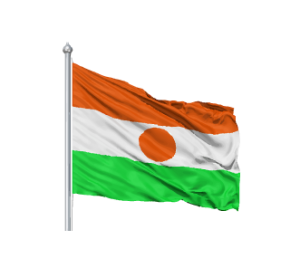
The Flag
The flag of Niger was adopted on November 23th, 1959.
The orange band represents the desert located in the north of the country, the green band the fertile plains in the south, and the orange circle the sun.
The coat of arms
The coat of arms of Niger was introduced on December 1st, 1962. It is composed of a golden sun, with on its left side two Tuareg swords and a spear which symbolize bravery. To the right of the sun, three ears of millet, and below, a head of zebu, together symbols of agriculture and livestock. The coat of arms is surrounded by four national flags and a banner that reads the official name of the country: “Republic of Niger”.
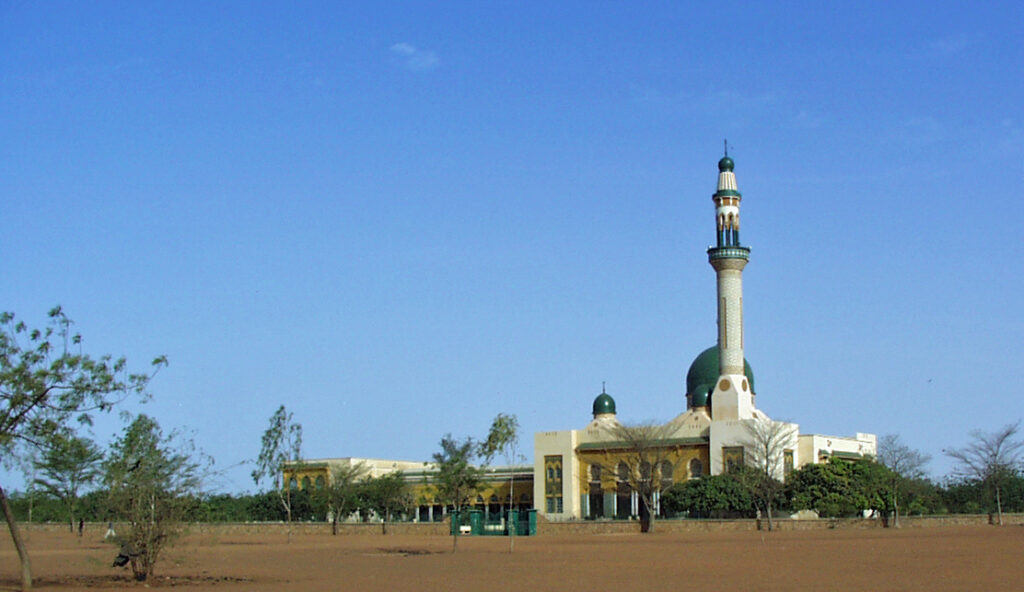
The Niamey Great Mosque, built in the 1970s
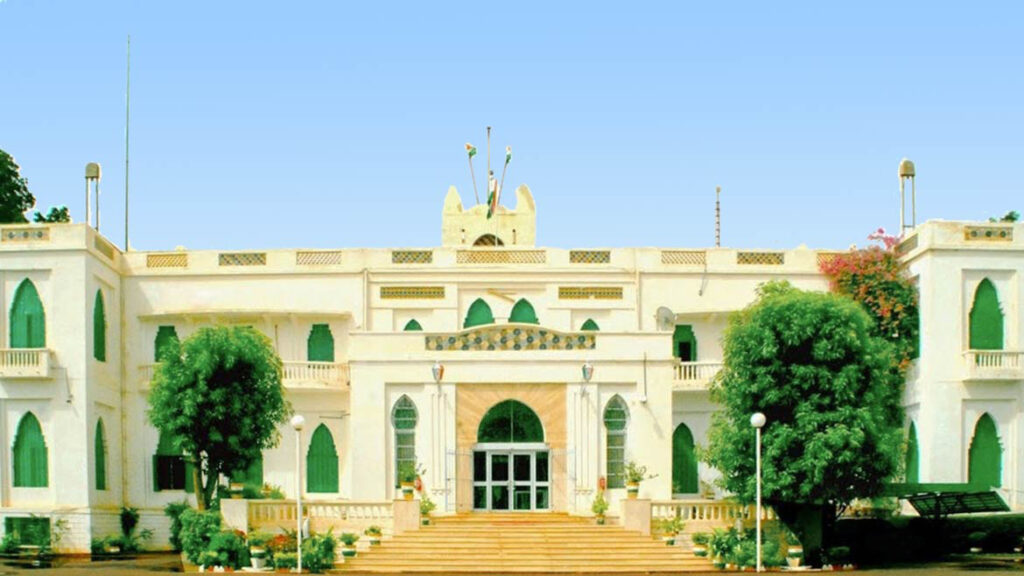
Presidential Palace in Niamey, built in the 1920s
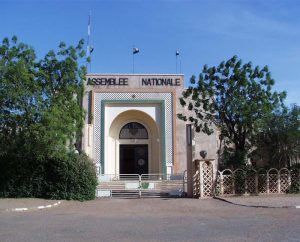
The National Assembly building in Niamey, built in the 1950s
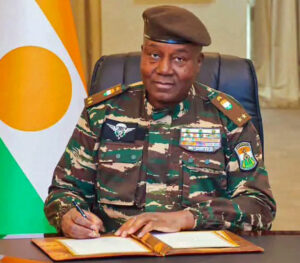
His Excellency Brigadier General Abdourahmane TIANI, President of the CNSP, Head of State
List of members of the Transitional Government (August 9th,2023)


